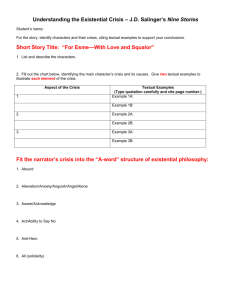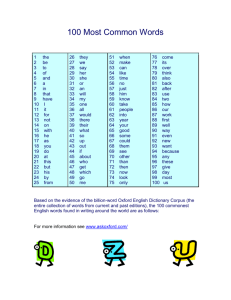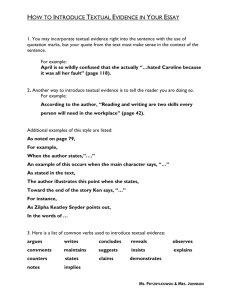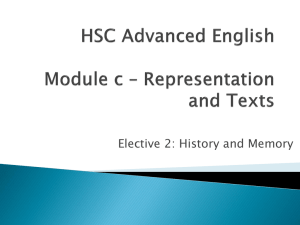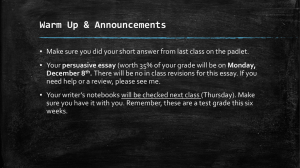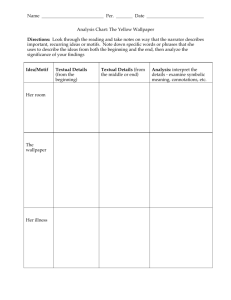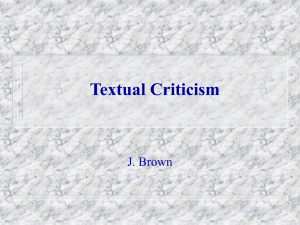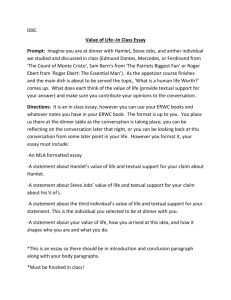File - English 200 E
advertisement
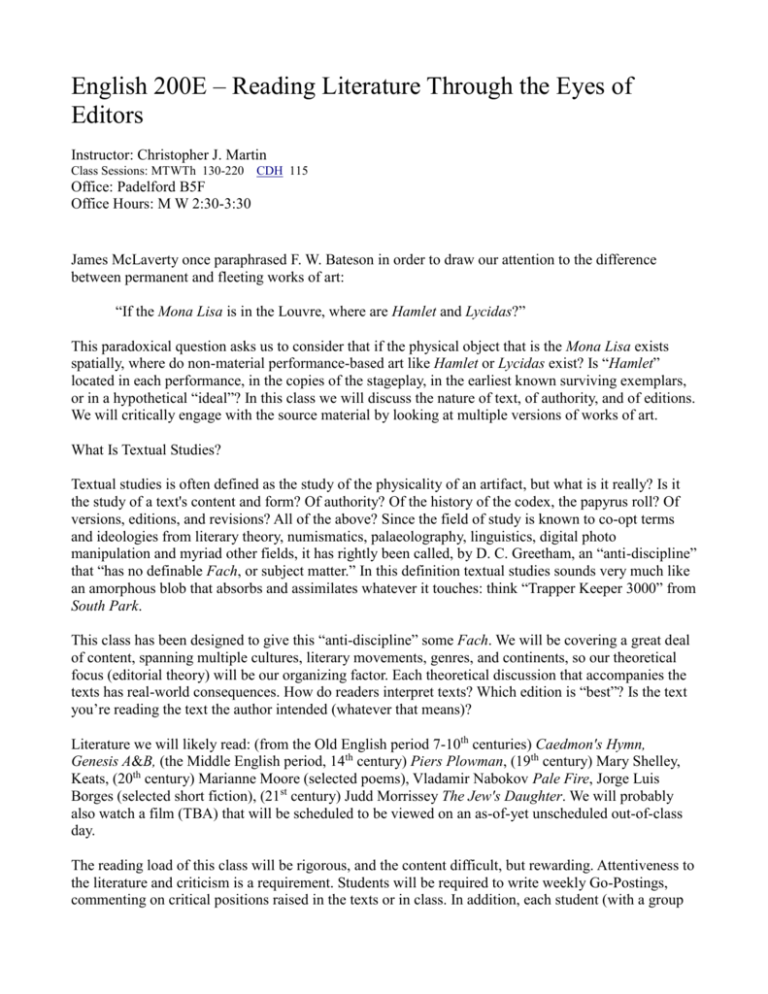
English 200E – Reading Literature Through the Eyes of Editors Instructor: Christopher J. Martin Class Sessions: MTWTh 130-220 CDH 115 Office: Padelford B5F Office Hours: M W 2:30-3:30 James McLaverty once paraphrased F. W. Bateson in order to draw our attention to the difference between permanent and fleeting works of art: “If the Mona Lisa is in the Louvre, where are Hamlet and Lycidas?” This paradoxical question asks us to consider that if the physical object that is the Mona Lisa exists spatially, where do non-material performance-based art like Hamlet or Lycidas exist? Is “Hamlet” located in each performance, in the copies of the stageplay, in the earliest known surviving exemplars, or in a hypothetical “ideal”? In this class we will discuss the nature of text, of authority, and of editions. We will critically engage with the source material by looking at multiple versions of works of art. What Is Textual Studies? Textual studies is often defined as the study of the physicality of an artifact, but what is it really? Is it the study of a text's content and form? Of authority? Of the history of the codex, the papyrus roll? Of versions, editions, and revisions? All of the above? Since the field of study is known to co-opt terms and ideologies from literary theory, numismatics, palaeolography, linguistics, digital photo manipulation and myriad other fields, it has rightly been called, by D. C. Greetham, an “anti-discipline” that “has no definable Fach, or subject matter.” In this definition textual studies sounds very much like an amorphous blob that absorbs and assimilates whatever it touches: think “Trapper Keeper 3000” from South Park. This class has been designed to give this “anti-discipline” some Fach. We will be covering a great deal of content, spanning multiple cultures, literary movements, genres, and continents, so our theoretical focus (editorial theory) will be our organizing factor. Each theoretical discussion that accompanies the texts has real-world consequences. How do readers interpret texts? Which edition is “best”? Is the text you’re reading the text the author intended (whatever that means)? Literature we will likely read: (from the Old English period 7-10th centuries) Caedmon's Hymn, Genesis A&B, (the Middle English period, 14th century) Piers Plowman, (19th century) Mary Shelley, Keats, (20th century) Marianne Moore (selected poems), Vladamir Nabokov Pale Fire, Jorge Luis Borges (selected short fiction), (21st century) Judd Morrissey The Jew's Daughter. We will probably also watch a film (TBA) that will be scheduled to be viewed on an as-of-yet unscheduled out-of-class day. The reading load of this class will be rigorous, and the content difficult, but rewarding. Attentiveness to the literature and criticism is a requirement. Students will be required to write weekly Go-Postings, commenting on critical positions raised in the texts or in class. In addition, each student (with a group of 3 others) will give one 15 minute presentation of a selected text and then lead classroom discussion that day. Since this 200 level literature course is also a W-course, students are required to write two 5-7 page essays over the course of the quarter. Paper topics must be submitted in writing to me two weeks before the paper is due. In preparation for the second paper, students will select a single edition of a work of literature and keep a journal as they go through it. For this second paper, students will be asked to answer this question about their selected edition: “Are there any interpretive consequences to a scholarly edition of the work? What are they?” For more information on W-course requirements, see the University of Washington description: <http://www.washington.edu/uaa/advising/degreeplanning/writreqs.php> Course Materials – Stuff you’ll need! Annotated Bibliography of Required editions: Crane, Stephen. The Red Badge of Courage. Norton Critical Editions. 4th ed. Ed. Donald Pizer. W. W. Norton and Co., 2007. McGann, Jerome. A Critique of Modern Textual Criticism. Charlottesville: University Press of Virginia, 1992. Nabokov, Vladimir. Pale Fire. Random House: Vintage International, 1989. Shelley, Mary. Frankenstein: the original 1818 text (Broadview Literary Texts) 2nd ed. D. L. Macdonald and Kathleen Scherf. Eds. Toronto: Broadview Press, 1999. Shelley, Mary. Frankenstein (Case Studies in Contemporary Criticism) 2nd ed. Johanna M. Smith. Ed. New York: Bedford St Martins, 2000. Shillingsburg, Peter. Scholarly Editing in the Computer Age. 3rd Edition. Michigan: Michigan UP, 2004. Other requirements: UW Email Account, Internet access, ability to type or write longhand. Class reader, which you can pick up from “Ave Copy Center” on 42nd and University Way (4141 University Way NE). Rules for Computer Use Because we’re a CIC (Computer Integrated Classroom), we have special access to information and technology that other classrooms don’t. But that means that we also need to maintain special restraint within the computer lab. No sitting on desks. No food or drinks (put them by the printer). No downloading of software (games, instant messengers, etc.). No surfing, typing, chatting, while others are talking. It's loud in the lab. Please speak up loud enough so that others can hear. Course Assignments – Stuff you’ll do! 1) 2) 3) 4) Read. Participate in class discussion Continue a class dialog by participating in weekly Go-Postings. write two 5-7 page papers. The first paper must be revised to receive full credit. Assessment – How you’ll be evaluated Paper 1: 20% Paper 1: revision 10% Paper 2: 30% Presentation: 30% Participation: 10% (Includes attending class, and making weekly Go-Postings.) Course Policies – The fine print! Attendance You are expected to be an active participant in class, so come prepared to contribute to the discussion and participate in activities. When you miss a class, you miss the opportunity to be a member of the class community. If you know you are going to miss class, please let me know in advance. Also, find another student to get class notes from and propose to me how you plan to make up missed work in a timely manner. Remember as well that it is particularly important for you to arrive on time. If you come in after class has started, even by only a few minutes, you will be considered late. Although I do not usually take attendance, I do, however, have a knack for remembering if people consistently come late or are not attending class. Attendance problems will negatively affect your participation grade. Conferences Conferences are not required for ENGL 200, but I would recommend coming to meet with me (through appointment) at least once this quarter. Treat me as if a usable resource for your queries. Since the class is large and writing ability will vary widely, it is up to you, as college students, to seek help when you need clarification, feel lost, or have fallen off the edge of the world. While we will do class writing activities some days, the focus of this class is on the literature and the criticism primarily. I am pleased to meet with anyone outside of class by appointment or in my office hours. Late Work Unless you have worked out a prior arrangement with me, all assignments are due on the date specified. I will not give feedback on assignments that are turned in late. You must come to office hours to receive feedback, if desired. However, you will still need to complete and turn in all late work. In the case of extreme emergency, you may talk to me in person and we can work out a policy appropriate to your situation. Accommodations Please let me know if you need accommodation of any sort so that I can work with the UW Disability Services Office (DSO) to provide what you require. I am very willing to take suggestions specific to this class to meet your needs. This syllabus is available in large print, as are other class materials. You can contact the DSO at 543.6450 or dso@u.washington.edu. Writing Resources I encourage you to take advantage of the following writing resources available to you at no charge: The CLUE Writing Center in Mary Gates Hall is open Sunday to Thursday from 7pm to midnight. The graduate tutors can help you with your claims, organization, and grammar. You do not need to make an appointment, so arrive early and be prepared to wait. The Odegaard Writing and Research Center is open Sunday to Thursday from 1:30 pm to 4:30 pm and 6:00 pm to 9:00 pm. This writing center provides a research-integrated approach to writing instruction. Make an appointment on the website: www.depts.washington.edu/owrc. Plagiarism – Things you don’t want to do! Plagiarism, or academic dishonesty, is presenting someone else’s ideas or writing as your own. In your writing for this class, you are encouraged to refer to other people’s thoughts and writing, as long as you cite them. As a matter of policy, any student found plagiarizing any piece of writing in this class will be reported to the College of Arts and Sciences for review. For more information, refer to UW’s Student Conduct Code at www.washington.edu/students/handbook/conduct.html. Classroom Respect Because the exchange of ideas is so important to this class, it is necessary for everyone to be respectful of one another. It is normal and even expected that, in our class discussions, we will disagree, but derogatory or discourteous language/behavior will not be tolerated in our classroom. My Pledge To You My pledge to you: I will do everything I can to make our class as valuable to you as possible. I won't waste your time. In return, I ask that you don't waste mine, either. My goal for this class is that we create a community of readers and writers who learn from one another. It is vital that you attend, participate, and generally do your best to make your time here productive. If however, you do feel that our time together is not being used effectively, please talk to me. I'm a reasonable person and I am willing to be flexible. Keep in mind that this is your class. If something doesn't seem to be working, we can work together to come up with a solution. (Schedule and Syllabus subject to change. Appropriate notice will be given)
